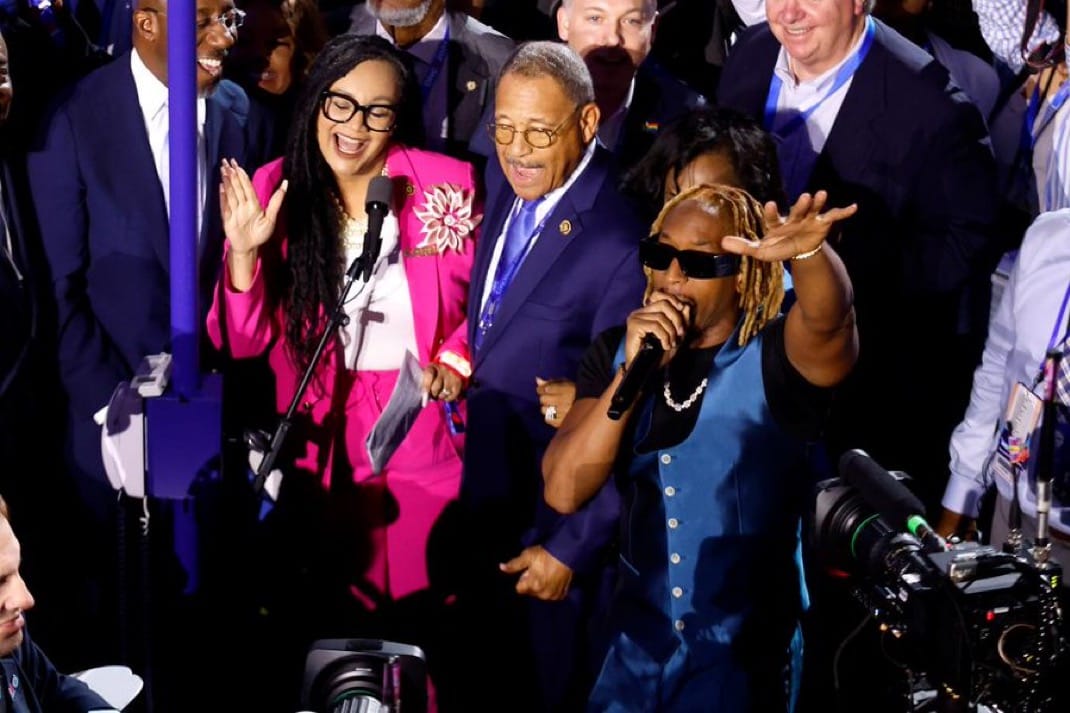Kamala Harris's DNC Strategy: A Focus on Black Culture Over Indian Heritage Sparks Debate
In a move that has sparked considerable discussion on social media and among political analysts, Vice President Kamala Harris's appearance at the Democratic National Convention (DNC) has been notably characterized by an emphasis on African American culture, with little to no representation of her Indian heritage. This strategic
In a move that has sparked considerable discussion on social media and among political analysts, Vice President Kamala Harris's appearance at the Democratic National Convention (DNC) has been notably characterized by an emphasis on African American culture, with little to no representation of her Indian heritage. This strategic choice has led to a debate over identity politics, cultural representation, and electoral strategy.
During the DNC, the atmosphere was electric with performances by high-profile rappers like Lil Jon and music from Kendrick Lamar, underscoring a clear nod to Black culture. This was particularly evident when California's delegates cast their votes for Harris, with DJ Cassidy playing Lamar's tracks "NOT LIKE US" and "ALRIGHT." These moments were not just musical choices but were seen as symbolic endorsements of Harris's connection to the Black community, highlighting her identity as an African American woman.
JUST IN: Georgia rapper Lil Jon makes an appearance at the Democratic National Convention, performs his hit song "Turn Down for What."
— Collin Rugg (@CollinRugg) August 21, 2024
Lil Jon was heard repeating one of the Democrats' new slogans "We're Not Going Back."
The performance comes before former President Barack… pic.twitter.com/m6cV7V7Jza
However, the absence of any Indian cultural elements, such as music or performances by Indian artists, has not gone unnoticed. Critics argue that this omission might suggest a strategic calculation by Harris's campaign to appeal more directly to Black voters, a demographic crucial for Democratic success. This approach has led to questions about authenticity and whether Harris is leveraging her Black identity more prominently for political gain.
Pennsylvania’s passionate roll call wowwww 🔥🔥🔥🥹🥹🥹
— Chris (@RealDealChris) August 21, 2024
Governor Josh Shapiro 👏🏽👏🏽👏🏽
DJ Cassidy let’s go💪🏽💪🏽💪🏽#DNC2024CHICAGO #DNC #DNCConvention #KamalaHarris pic.twitter.com/hLkLiO0S8p
Political Strategy or Cultural Identity?
Kamala Harris's background is complex; she is the daughter of an Indian mother and a Jamaican father, making her identity a blend of both cultures. Historically, Harris has engaged with both communities, but her DNC appearance has been interpreted by some as a deliberate choice to align more closely with Black culture. This could be seen as an attempt to solidify her standing within the Black community, especially given the significant role Black voters play in Democratic primaries and general elections.
Public Reaction and Analysis
On X (formerly Twitter), reactions have been mixed. Some users expressed frustration, with sentiments like, "If you’re a White person watching the #DNC2024CHICAGO, you should feel absolutely disenfranchised. It’s all black women and hip hop trash," indicating a perceived exclusion of other cultural identities. Conversely, others celebrated the cultural representation, seeing it as a powerful statement of unity and identity.
Political analysts suggest that this strategy might be rooted in the demographic realities of American politics, where Black voters have historically been pivotal. However, this approach also risks alienating other segments of her base, including Indian Americans who might feel overlooked.
The DNC's cultural choices for Kamala Harris's nomination reflect a broader conversation about identity in American politics. While Harris's campaign might argue that this focus on Black culture is part of a broader strategy to engage with communities that have been historically marginalized, the lack of Indian cultural elements raises questions about the balance of her heritage in her political identity. This situation underscores the complexities of multicultural identity in the political arena, where cultural representation can be both a celebration and a strategic tool.




